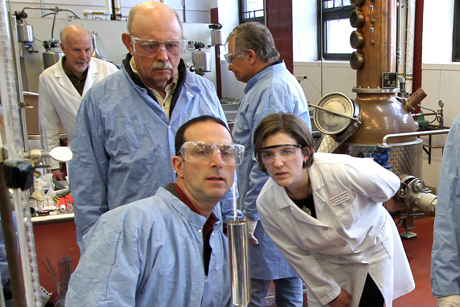Workshops spread the science of selling wine
By Amanda Garris

Cornell enologists are teaching tasting room staff the science behind turning customers’ sips into sales.
Just in time for the summer tourist season on wine trails across the state, the Cornell Enology Extension team offered a crash course in viticulture, the mechanics of winemaking, the answers to common consumer questions, as well as the latest research on wine consumer behavior, as part of a workshop at Cornell’s New York State Agricultural Experiment Station in Geneva (NYSAES) May 14.
“Tasting room staff are the ambassadors for New York wines as a brand, so it’s important to reach out to them, not just winemakers,” said organizer Anna Katherine Mansfield, assistant professor of enology in the Department of Food Science. “We have solid data to help winery staff supplement their instincts about how to sell wine.”
According to presenter Kathy LaTour, associate professor of services marketing in the School of Hotel Administration, thinking like a novice is vital.
“When pros talk about wine, the terminology they use can create distance between the consumer and the wine,” she said. “Wine can be a difficult product to learn, and who wants the terms ‘cat-pee’ and ‘wet stone’ in their introduction to wine? The language should be specific, tangible and relatable. …
“[It] should be tailored to help the consumer learn about wine and quickly identify the wines they will like the most,” she said.
Lauren Thomas, a graduate student in the field of food science, presented new research on factors that drive sales in tasting rooms, a collaboration between Mansfield and Miguel Gómez, the Ruth and William Morgan Assistant Professor of Applied Economics and Management in the Charles H. Dyson School of Applied Economics and Management.
“In the tasting room, the key factors that affected sales were tasting room cleanliness, the grounds and the view, the presentation of wines for purchasing, the friendliness of the pourer and pourer appearance,” said Thomas. “Only one – the variety of wines tasted – had directly to do with wine.”
Her research suggests that wine jargon has a negative impact on sales. In fact, on days when wineries provided tasting notes without any aroma descriptors for the wine, sales increased about 11 percent.
One of the most practical aspects of the workshop involved identifying common defects that can deter customers, such as those caused by overexposure to oxygen and the musty aroma of cork taint.
“It’s one thing to talk about flavors in theory and quite another when you can taste them at the same time,” said Kim Aliperti, owner and general manager of Billsboro Winery. “I brought two new employees to this workshop, and I’d bring more if it is offered again.”
The team has held six workshops across the state – on Long Island, at the Cornell Lake Erie Research and Extension Laboratory in Portland, N.Y., and NYSAES – and trained nearly 200 winery staff. Future Enology Extension Lab events include a two-day introduction to grape growing and winemaking for people interested in getting into the industry, scheduled for late August.
Amanda Garris, Ph.D. ’04, is the communications officer for NYSAES.
Media Contact
Get Cornell news delivered right to your inbox.
Subscribe